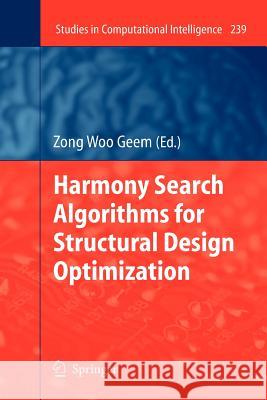Harmony Search Algorithms for Structural Design Optimization » książka
Harmony Search Algorithms for Structural Design Optimization
ISBN-13: 9783642260520 / Angielski / Miękka / 2012 / 227 str.
Harmony Search Algorithms for Structural Design Optimization
ISBN-13: 9783642260520 / Angielski / Miękka / 2012 / 227 str.
(netto: 390,56 VAT: 5%)
Najniższa cena z 30 dni: 385,52
ok. 16-18 dni roboczych.
Darmowa dostawa!
Various structures, such as buildings, bridges, and paved roads play an important role in our lives. However, these construction projects require large expenditures. Designing infrastructure cost-efficiently while satisfying all necessary design constraints is one of the most important and difficult tasks for a structural engineer. Traditionally, mathematical gradient-based optimization techniques have been applied to these designs. However, these gradient-based methods are not suitable for discrete design variables such as factory-made cross sectional area of structural members. Recently, researchers have turned their interest to phenomenon-mimicking optimization techniques because these techniques have proved able to efficiently handle discrete design variables. One of these techniques is harmony search, an algorithm developed from musical improvisation that has been applied to various structural design problems and has demonstrated cost-savings. This book gathers all the latest developments relating to the application of the harmony search algorithm in the structural design field in order for readers to efficiently understand the full spectrum of the algorithm's potential and to easily apply the algorithm to their own structural problems. This book contains six chapters with the following subjects: standard harmony search algorithm and its applications by Lee; standard harmony search algorithm for steel frame design by Degertekin; adaptive harmony search algorithm and its applications by Saka and Hasancebi; harmony particle swarm algorithm and its applications by Li and Liu; hybrid algorithm of harmony search, particle swarm & ant colony for structural design by Kaveh and Talatahari; and parameter calibration of viscoelastic and damage functions by Mun and Geem.











